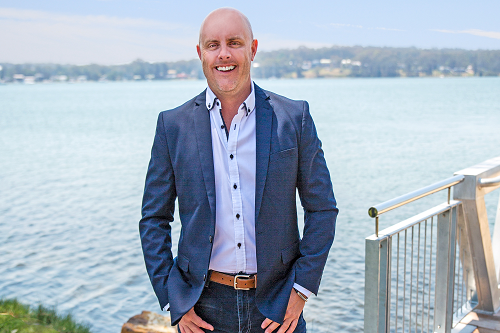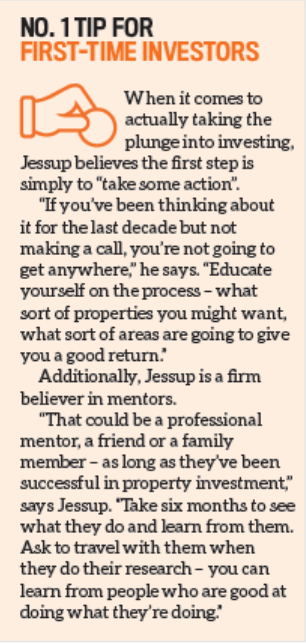Property investment is full of potential pitfalls. But how can you avoid them and minimise your risk?
Since 2003, Wayne Jessup has been helping Australians successfully invest in their future under the banner of The Property Bloke. He’s been heavily involved in property since his teens, looking for the best ways to build a portfolio and boost both earning potential and overall growth.

“I started reading about investment property from a fairly young age – about 16 – and decided that was what I wanted to do with myself,” Jessup explains. “I went on to buy my first investment property at 18 and started working in the industry in a more formal capacity a couple of years after that. Ever since then, my goal has been to help people invest in property to secure their financial future.”
In his day-to-day role as The Property Bloke, Jessup is passionate about people avoiding the potential pitfalls of property investments. During his time in the industry, he’s seen plenty of investors make mistakes, and even learned from a few of his own. He’s compiled some of the most common here, and discusses how they can be avoided.
1. Mistake #1: Loan structure
“Probably the biggest thing I see on a regular basis is investors getting their loan structures wrong and not setting up their loans correctly,” says Jessup. “People don’t realise the tax advantages of some of the loan structures and how they can be if they’re set up incorrectly; they can be really hard to break and also restructure.”
Jessup is quick to clarify that the loan structure is not the type of property, lender or bank – it’s the actual conditions of the loan outlined in the contract.
“People have a broad range of opinions about this. Some people with cash think it’s good to pay that cash off the property and have it in there as redraw, but that affects the tax deductibility of the loan,” Jessup explains.
By contrast, he suggests that having an offset account is the best option, as money is still accessible without affecting the tax deductibility of that investment loan.
“On a regular basis I see people having a financial windfall – maybe through a redundancy, for example,” says Jessup. “So they pay the money off the investment property but they want to maybe use it for upgrading to a new home or a car, and the tax deductibility of that investment loan is just totally gone now.”
It can end up being a significant issue, potentially causing other problems down the track, Jessup notes.
“They’ve got a big issue, and in some cases they have to sell the property off to regroup and buy another property,” he says. “Not to mention that it will come with capital gains issues – and if you’re selling property unexpectedly, you might not have the best opportunity to take advantage of the wider market trends. It’s a less than- ideal situation.”
2. Mistake #2: Ownership structure
Ownership structure is crucial, whether you’re a first-time investor or you own 10 properties, Jessup explains.
 “It comes down to who wants the property,” he says. “Whether it’s you personally, you and your partner jointly, or assignage of ownership under a company, a property trust or any other type of structure, you need to make sure you’re seeking advice beforehand.”
“It comes down to who wants the property,” he says. “Whether it’s you personally, you and your partner jointly, or assignage of ownership under a company, a property trust or any other type of structure, you need to make sure you’re seeking advice beforehand.”
Once you’ve purchased a property, Jessup explains, it’s difficult to change ownership without working through a substantial amount of red tape. You’ll need to sell the property, and that involves a whole variety of complications.
“You need to be smart about how you can minimise your expenses,” says Jessup. “Sometimes you have partners who are earning substantially more income than one or the other. From a long-term tax deductibility perspective, the property should probably be in the higher income earner’s name. Conversely, if you’re looking at flipping the property within a relatively short-term period and you’re seeking a favourable capital gains situation, you want the property to be in the lowest income owner’s name.”
It’s a similar situation when you’re purchasing within a company or property trust structure, Jessup explains. Careful consideration is required beforehand in order to maximise the potential benefits.
“If you’re looking at moving your money around with a company, as opposed to taking it and putting it in your own personal finances, you’re only going to pay a maximum of 30% tax,” says Jessup.
“So you can potentially have a lot more money to invest into the next property, development or subdivision – whatever you decide to do.”
3. Mistake #3: Copying someone else
Jessup cautions against copying other investors in an attempt to “keep up with the Joneses”. It can cause serious financial turmoil if you’re unprepared, or decide to make a purchase on the basis of emotions like jealousy.
“Copying somebody else who has different financial circumstances to you can put you in a really bad financial situation,” says Jessup.
“So, just because a family member or a friend bought an investment property doesn’t mean you have to. I’m not saying it won’t suit you, but I am saying that you need to have a serious look at their financial situation compared to yours. You might need a different plan of attack in your own situation.”
People can also get carried away with the idea that a place they would like to live is also a good place to invest.
“Throughout 2020, we plan to be doing a lot more work on loan structures, affordability and lending comparisons"
“A lot of places where you want to live are not good for investing,” says Jessup. “So keep that in mind when you’re considering someone else’s purchases too – don’t let it drive you.”
4. Mistake #4: Not enough research
There are so many different types of properties available on the market, but not all of them are necessarily right for you. Jessup likens it to a “funnel of opportunities” and cautions that prospective investors should be looking for something that meets their specific needs.
“We’re really big on education at The Property Bloke,” says Jessup. “So we make sure you’re 100% educated on what style of property investment you should be buying.”
There are multiple contributing factors, he notes. Age, personal financial goals and current income, along with a variety of other factors, are all contributors.
“Lending criteria now is tougher than it’s been in a long time, and it looks set to stay that way for the time being,” Jessup says. “Throughout 2020, we plan to be doing a lot more work on loan structures, a ordability and lending comparisons. Investors need to make sure they’re doing their due diligence well ahead of time.”
“Lending criteria now is tougher than it’s been in a long time, and it looks set to stay that way for the time being”
In terms of time frame, Jessup suggests looking at properties three to six months before the planned purchase date.
“Investors should be doing the education and the research six months out from when they want to buy,” he says. “We see a lot of people who wake up one morning and say, ‘I want to buy an investment property today’. But that’s not the way it works; it’s a longer process and you need to be educating yourself and fi guring out the property criteria that suits you well beforehand.”
5. Mistake #5: FOBO
Originally coined by US venture capitalist Patrick McGinnis, FOBO – or ‘Fear of Better Options’ – is a common issue for many prospective investors, Jessup says.
“FOBO is analysis paralysis,” he explains. “It’s basically a whole heap of procrastination where you think you’re always going to find a better property than the one you’re looking at today.”
But if you’ve done your research on the area and you find a property that you think fits your criteria, Jessup says you should probably go for it.
“Every time you look at it, it’s going to be more expensive,” he says.
“You’re going miss out on the good ones and you’re going to end up buying something you don’t want. That’s the biggest issue I see with people who procrastinate.”
“The earlier you start investing the better. I try to get people to start as young as they can”
Jessup indicates that one of the biggest risks is actually missing out on potential growth and income from that property investment.
“What I see on a regular basis from investors is once they finally set up that first property, there’s a lot of regret that they didn’t start earlier,” he says.
“So the earlier you start the better. I try to get people to start as young as they can. At 18, when they have a good job, I encourage people to start to save some money. You won’t regret buying a good, solid property as early as you can within your financial scenario.”
ABOUT THE PROPERTY BLOKE:
Property investing can be a confusing process. However, if you plan your property investment purchase to meet your long-term goals and financial position, property investing can be an enjoyable experience with great returns.
The Property Bloke is your personal property investing coach, helping to make the maze of property investing easier. The Property Bloke is your mentor, coach and property guidance expert providing a personalised approach to educate and empower you so your investment achieves a desired lifestyle outcome for you, your family and your future. Regardless of your reasons for investing, your education starts with the Property Bloke.
To find out more about how The Property Bloke can help you navigate the maze of property investment, visit: www.thepropertybloke.com.au

